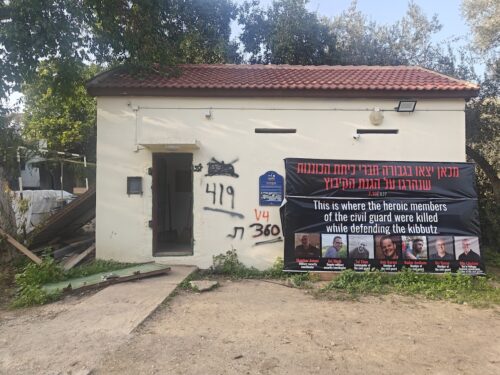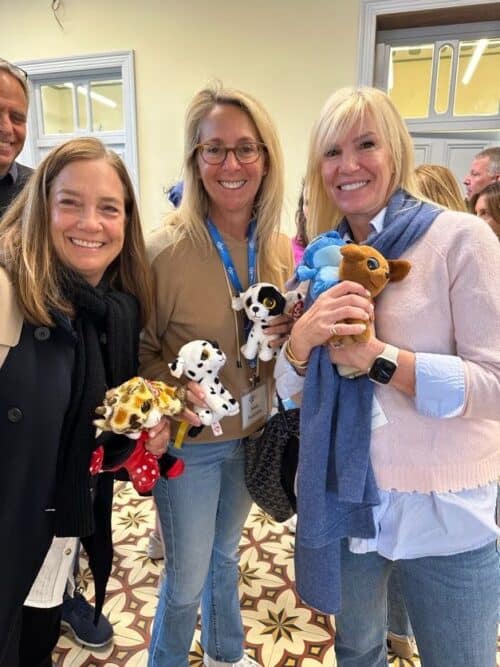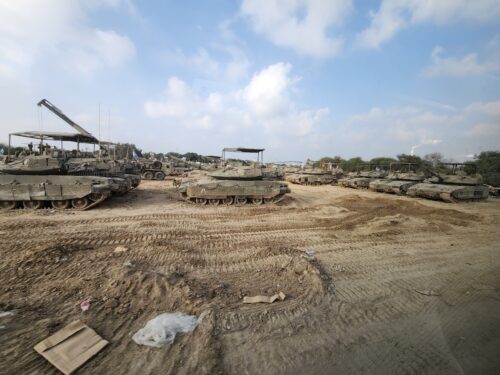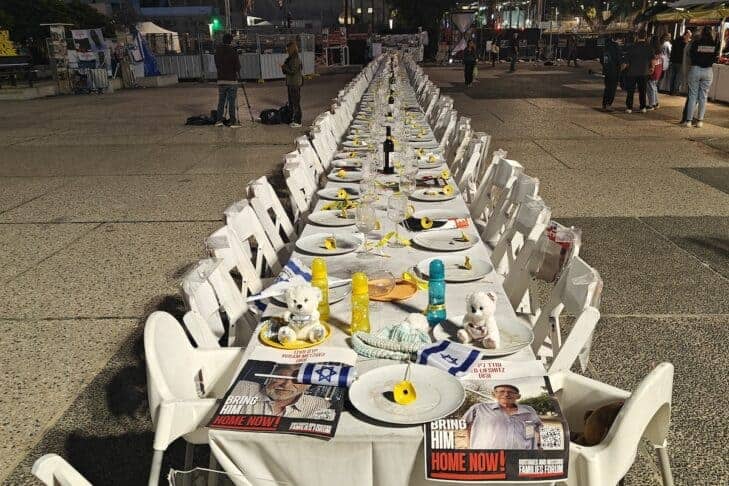With a view directly into Gaza in front of us, and the remnants of vibrant humanity murdered, scattered, and scorched behind us in the young adult neighborhood of Kfar Aza, we linked arms and sang the Israeli national anthem, “Hatikva.” We sang in Hebrew and ended in English: “As long as the Jewish spirit is yearning deep in the heart, with eyes turned East, looking toward Zion—then our hope—the two-thousand-year-old hope—will not be lost: to be a free people in our land, the land of Zion and Jerusalem.”
I was incredibly humbled and proud to lead CJP’s first solidarity mission to Israel this past week, alongside Amy Mitman, CJP’s vice president for individual giving and campaign, and chaired by Gideon Argov and Jeff Bussgang. We spent 2.5 days on the ground in Israel, bearing witness in real time to the utter destruction and despair, while also absorbing the resiliency and bravery of a people who have risen to meet this moment with a spirit that can’t be put into words but that can be felt in every breath you take while on the ground.

Our group had the immense privilege of visiting with CJP grantees, including spending time at the temporary Tel Aviv homes of the members of Kibbutz Re’im, made possible by a $1 million grant from CJP’s Israel Emergency Fund. We were joined by kibbutzniks who shared their painful stories. One woman described how dislocated she feels, not just physically but in her sense of self. For many years, living so close to the Gazan border, she drove Gazans to their doctors’ appointments in Israel. She formed relationships and worked tirelessly as what she described as a “peacenik.” Since Oct. 7, after she watched her home desecrated and her friends murdered around her, she told us she has “lost her compassion” and doesn’t yet know how to understand her own sense of identity.
“The hugs you are bringing matter. It is one of our only sources of hope. You came to see what happened with your own eyes; you aren’t letting the world tell you it didn’t happen.”
And yet, life continues as affirmed by the joyful smiles of the 17 toddlers and young children of the kibbutz when they received the Beanie Babies from our group. Time and time again, Israelis told us, “The hugs you are bringing matter. It is one of our only sources of hope. You came to see what happened with your own eyes; you aren’t letting the world tell you it didn’t happen.” I like to think that the Beanie Babies for the Kibbutz Re’im children are ongoing hugs, holding them at night from each of us in Boston.

As we prepared for this intense journey from Boston, we had been optimistic that we could find a way to build a narrative of hope into our experience. And yet, the reality of this moment, as explained to us in extraordinary briefings from Col. Miri Eisen, scholar Danny Gordis and special envoy to combat antisemitism Michal Cotler Wunch, is not yet a story of hope or optimism, but rather one of determination and resilience built on uncertainty and even palpable terror and fear.
Without question, there were moments across our trip of smiles and levity. We shared lunch with a reserve tank unit right on the Gazan border popularly known as the “Phoenix,” given that the tank operators are all older and they are operating refurbished, formerly retired tanks. We heard their jokes, camaraderie, and care for one another and their commitment to upholding ethics in the darkest of times. We had an inspiring visit to a company right within the Gaza envelope that is revolutionizing the plastics industry and persevering with a mission to save the planet even as members of their workforce were killed on Oct. 7 and most others are now driving over two hours to work each day from a hotel room they’ve been put in for the last three months. And as we had dinner in an extraordinary restaurant in Tel Aviv, whose kitchen staff are all youth at risk building lives for one another, we heard birthday parties, friends gathering, and laughter.

But Israel is at war and the Jewish people are in pain. I have returned feeling like I stepped into the pages of history; it feels imperative to me that as leaders of the Jewish community, we all go to bear witness to the atrocities in the South. There is no photo or string of words I can put together that can replicate the feelings of walking amongst fresh death. You put your feet one in front of the other amongst the ruins of Kfar Aza, but it is the feeling you take home of standing amongst the physical trails of people being dragged from their beds by their hair. You can still hear in your mind the screams of the women who were raped and then murdered, with no outrage yet from the international community.
When we sat in Tel Aviv’s Hostage Square with families begging for help returning their loved ones or when we visited with injured soldiers or met a returned hostage, we saw the hollowness in their eyes. You can’t help but wonder what being okay eventually will mean for them. We heard Israelis excruciatingly acknowledge that the price Gazans are paying is terrifyingly high, and that the realities of war are torturous as the future of Israel is in the balance.
On our last day, we had a visit to the Kotel (Western Wall) planned. It felt important to us that we give our group the opportunity to reflect on this trip with their hearts and spirits. As luck would have it, 50,000 other people had the same idea and our visit coincided with a prayer service calling for the return of the hostages, led by both chief rabbis of Israel and attended by many hostage families. We stood, we prayed, and, most memorably for me, we felt the reverberations of the blow of the shofar, sounded for many minutes, lifting up directly to the heavens, knocking on the Western Wall, and hopefully reaching the souls of those still held in captivity.
There is so much we should be proud of at CJP—our grants are changing lives on the ground, they are giving hope, they are meeting the moment. We are not shying away from the complexity or the realities and we are not denying the multiple ways of looking or thinking about the cost of war to all. My colleagues put a mission together that changed our lives. And yet there is so much more to do. There are too many people still in need.
Sunday, Jan. 14, marks day 100. In our conversation with Hersh Goldberg Polin’s parents (Hersh is still in captivity), their most explicit ask to us was to take a piece of masking tape on Sunday, write “100” on it, and cover your heart. Hold them and their son, and all 135 other hostages, in your soul.
It was almost impossible to leave, and unimaginable that as our group flew over Europe on our way home, an Orwellian proceeding putting Israel on trial for genocide began below us at the Hague. For that reason and so many more, we must all go bear witness. We must see with our own eyes what happened on Oct. 7 and form our own conclusions. We need to hear the voices of Israelis—Jewish, Arab, Druze, and more. I am so grateful to CJP’s board members who experienced these moments with us. We experienced something sacred together and feel recommitted to doing our part each and every day.
Am Yisrael Chai.



